The
Wild Land
by Cao Yu
English Adaption by Doris Chu
Premiere Production in 1995
at The Tower Auditorium of the Mass College of Art
, Boston
CAST
in order of appearance
Pei, the Moron/Dog Head Yu
Ming Toh
The Tiger (Ch'ou Hu) Christian
Huber
Mrs. Jiao Anne
F. Loughlin
Jin-ze Patricia
Chen
Ta Hsing Jose
Sia
Chang Wu Yih-Jian
Ta
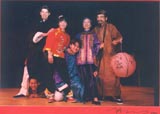

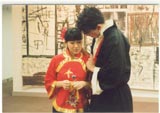
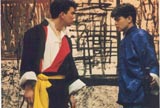
A New Production in 1999
at the Tremont Thetre
Directed by Jackie Romeo
Cast
in order of appearance
Pei, the Idiot/Dog Head Porter
McDonald
The Tiger (Chou Hu) Francis
Elliott
Mrs. Jiao Margaret
Moore
Jin-ze Priscilla
Ovalle
DaXing John
Bowen
Chang Wu Michael
Abdow
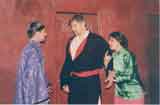
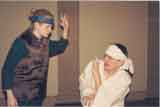
The story, set at the turn of the century, deals
with the conflict between a blind woman and her daughter-in-law
who is being tormented by the older woman for stealing
the affection of her son; and with the revenge of
an escaped convict, Tiger, who is the former lover
of the daughter-in-law, against the injustices of
a brutish landlord, Jiao Yen-Wang, the late husband
of the old woman, who put Tiger in jail and forced
his fiancee to marry his (Jiao's) son. When the daughter-in-law
meets her former lover after he has escaped from jail,
she responds immediately to his sexual and spiritual
strength and sees in him a long awaited opportunity
to escape her weak husband and vicious mother-in-law
to find a land of perpetual joy.
Other infomation of interests:
Other International and Asia On Atage productions
Adapter's Note
The Wild Land is the third of a trilogy, the first
two being The Thunderstorm and Sunrise, written in
the 1930s by Cao Yu who later became one of the most
renowned Chinese playwright of this century. In the
trilogy Cao expressed his indignation against such
social ills as oppressions and hypocrisy. He encourages
one to revolt because he is convinced that only those
who dare to revolt are masters of their fate.
The best achievement of Cao Yu's plays, I think,
is the dialogue. Using native Beijing dialect, the
dialogues are natural and imbued with life. The playwright
is not afraid of loquacity and repetition because
in real life, people are often loquacious and repetitive.
Therefore, Cao's characters are so alive that they
seem to jump out of the pages while one is reading
the play.
When Asia On Stage and the Chinese Culture Institute
planned to produce this play I was going to do a literal
translation. After reading it, however, I decided
that it would be better to adapt it. The original
was very long. A translation would not be any shorter.
The arresting quality of the Beijing dialect will
certainly be lost in the translation while many slang
and cursing words, if translated directly, will be
meaningless and only confuse the audience. The engaging
quality of the characters' verbosity that makes them
so much like the real Beijing folks may not work in
an English language production. Furthermore, the stage
is different from real life. As such we should not
present a slice of life as it is on stage.
Confined by the three walls and the space contained
by those walls, and the limited possibilities of scenes,
a stage play does not have the fluidity of the film.
It must be more compact. The dialogues must be purposeful.
Otherwise the tension of the plot may be loosen. For
these reasons, I decided to adapt rather than translate
the original into English. Except for some cutting
in the final act, I basically kept the plot and the
characterization of the roles intact. As for the dialogues,
while maintaining fluency, I tried to avoid sounding
like the 1990s language. Instead, I attempted to inject
some flavor of the proper period and locale. When
comparing the English script with the original play,
one will find discrepancies in the dialogues. This
is because in the process of adapting, the dialogues
are rewritten while every point of the characters'
utterance has been kept. --Doris
Chu
Please support our program by
Joining our membership.
Attending the events (watch What's
New)
Making donations -- Send your tax deductible donation
to
International Society
276 Tremont Street
Boston, MA 02116)


